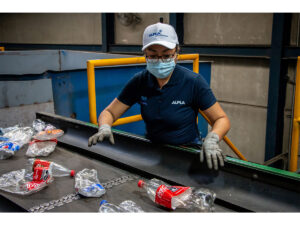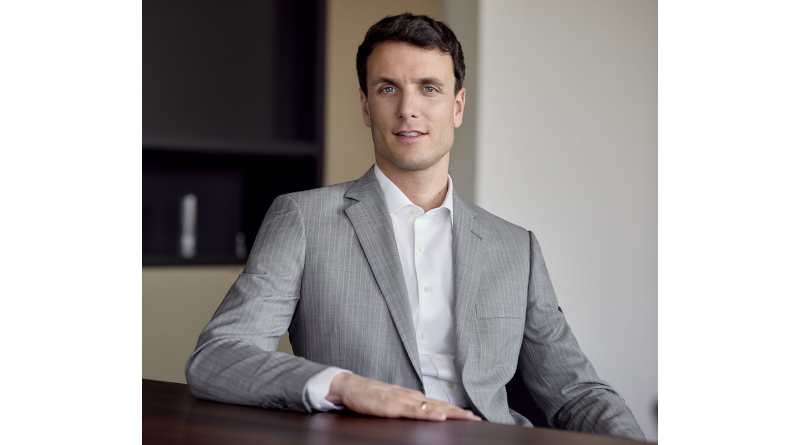Raising awareness and engaging with consumers
Interview with Philipp Lehner, CEO Alpla Group, on his social media activities, by Gabriele Kosmehl
Plastics face a tough battle in public perception, with PET bottles often symbolising increased concern over waste. Shedding light on this issue is crucial. Philipp Lehner, CEO of the Alpla Group, is taking to multiple social media platforms like Youtube, Instagram, and Tiktok to debunk myths surrounding plastics. Through fact-based short videos, he directly addresses consumers, aiming to foster awareness and understanding.
PETplanet: You’ve been very active on social media for more than a year now, debunking common myths about plastics and recycling in short videos. How did the idea come about?
Lehner: Alpla is a family company. And for us, this means a clear commitment to sustainable social responsibility and transparent communication. We also stand for plastic as a versatile, high-performance and resource-saving material. We want to expose myths and provide fact-based information about plastic. This is the driving force behind our commitment to social media. In addition to Alpla, I would like to set an example there with my own channels. For this purpose we have also launched the initiative “plastic is fantastic”. With this initiative, we want to raise awareness and seek dialog with consumers.
PETplanet: How has this initiative been received by consumers?
Lehner: Plastic is fundamental to our lives, but it is not an explicit lifestyle topic. For manufacturers in the industry, communication via social media is still unusual. So, it is clear to us that it takes time to reach people on social media. But we want to continue this open communication. Our video “plastic is fantastic” on Youtube has been viewed over 1.9 million times in three months. That is a good result. Especially when you see that plastic is being criticised. But plastic is an integral part of our daily lives. And there is also a change in thinking: due to its good recyclability, plastic is transformed from a disposable product into a source of valuable material. There is a lot of movement on this topic. This is why people are also becoming aware of the topic on social media. And we will be an active part of it.
PETplanet: Users, especially on Tiktok, are typically in their teens or in the 25 to 34 age group. Do you find young people more receptive or concerned about the topic of plastics?
Lehner: Young people are influenced by many information channels. They follow stars and influencers on social media and see their opinions. It is important that they form their own opinion based on facts. Plastic is a very emotionally charged topic. Because of the waste. But the material is not the problem. The problem is how we handle it. Plastic saves resources in production and transportation, it can be easily recycled, is therefore sustainable. But we must give waste a value, then there is a market and plastic waste will be collected – and does not end up in the environment. In Mexico, for example, there are collection systems that help us get used plastic and then recycle it and make new bottles from it. With good results. People can earn their livelihood by collecting plastic there. This creates new opportunities on the job market and protects the climate and the environment. If we combine the benefits of new plastic with the value of used plastic, we achieve a good perspective. We can establish a sustainable circular economy. Innovation, not renunciation, secures the future.
PETplanet: Do you also engage in discussions in the comment sections?
Lehner: Of course we are watching it, we are interested in the reactions and opinions. Our company and I can learn from this. We work as a team and react, but we don’t push ourselves into the foreground. We will see how it develops.
PETplanet: What challenges have you faced in trying to educate consumers about plastics and recycling through social media, and how have you met them?
Lehner: As mentioned, plastic is an emotionally charged topic and there are many myths about the material. That’s why we want to clear things up – with facts. Personal, informative and with exciting topics about plastic. You need a good team behind you to implement this. You have to stay attentive, develop a feel for topics and you must find an own, distinctive sound.
PETplanet: Beyond your own efforts on social media, what other measures would you like to see implemented to improve awareness and practices regarding plastics and recycling?
Lehner:In addition to social media, there is also the “aVoice” project with which we are now active in 22 countries worldwide to give plastic a voice that is heard. With this, Alpla aims to raise awareness among the population about the responsible use of plastic as a recyclable material and to start a conversation with people. The raising of awareness succeeds through education. We are not interested in greenwashing and polemics; we want to convince honestly and live our new understanding. This is exactly what “aVoice” stands for. In combination with the initiative “plastic is fantastic”, we can change opinions and things. Now we have over 8 billion people on the planet. Plastic is becoming even more important – in medical care or as a safe packaging for protection and transportation of food. The PET bottle is an important component of a mobile drinking water supply. New products are created from collected plastic waste or energy is generated from it. That’s why we believe in the future of plastic. And that’s what we are working towards.
PETplanet: Thank you very much Mr Lehner.
https://linktr.ee/philipp_lehner
https://linktr.ee/aVoice_campaigns
PET recycling plant in Tabasco, Mexico
Packaging specialist Alpla is currently building a recycling plant in partnership with beverage filler Coca-Cola Femsa in the Mexican state of Tabasco. Through the joint venture, approximately 60 million US dollars are being invested in the new high-tech facility, named Planeta, which will be able to recycle more than 50,000 t/a of used PET bottles. The material is sourced from 18 dedicated collection points, where intermediaries deliver it after purchasing it from regional collectors. Overall, the plant will create about 20,000 direct and indirect jobs. The plants compensate collectors for the delivery of recyclable plastic waste – a foundation for active waste management in areas where disposal options are otherwise lacking.

Through the 18 collection points already in operation for the Planeta plant, approximately 15,000 t of used PET have already been collected, with 4,000 t set for processing at the planned start of the facility in July 2024. The remainder has been processed by Imer and other recycling facilities in Mexico. The annual production capacity of the new factory will be 35,000 t of recycled material, obtained from over 50,000 t of disposed PET, which is equivalent to roughly 1.6 billion recycled 1.5 l plastic bottles per year (assuming a weight of 30 g for a 1.5 l bottle), thus reducing the amount of waste ending up in landfills or nature.
Coverage of structurally weak regions
Unlike the Imer recycling plant, where collection points are located in urban centres with good connectivity, the collection points delivering to the Planeta plant, located in southeastern Mexico, also cover structurally weak regions. This primarily supports rural material suppliers, who can already deliver small quantities of 20 to 50 kg through this process. In addition, each of the 18 collection sites has two pickup trucks with trailers, used to collect recyclables from collectors in remote areas. At full capacity, the recycling plant will create about 20,000 direct and indirect jobs, serving as a significant driver for sustainability and economic development. Collectors can earn income equivalent to the minimum wage, depending on the current purchase price, by delivering approximately 30 to 35 kg, or about 1,000 PET bottles.

